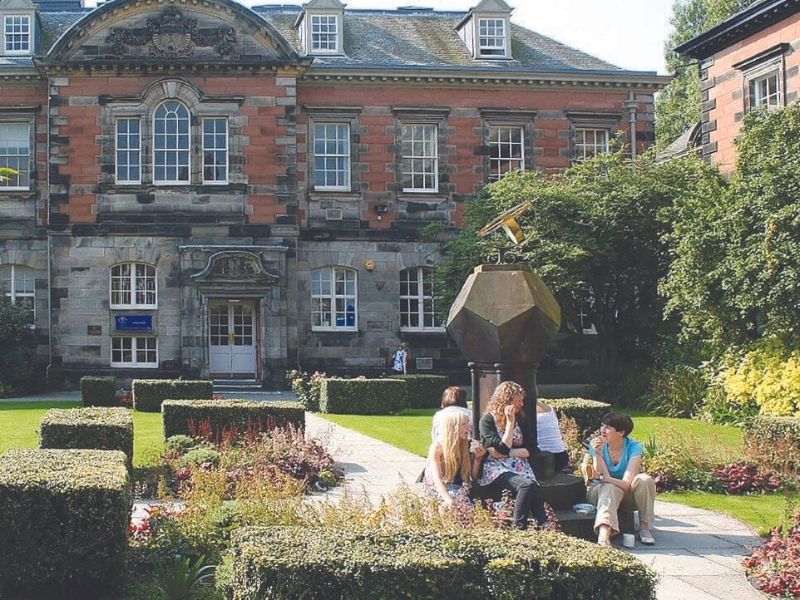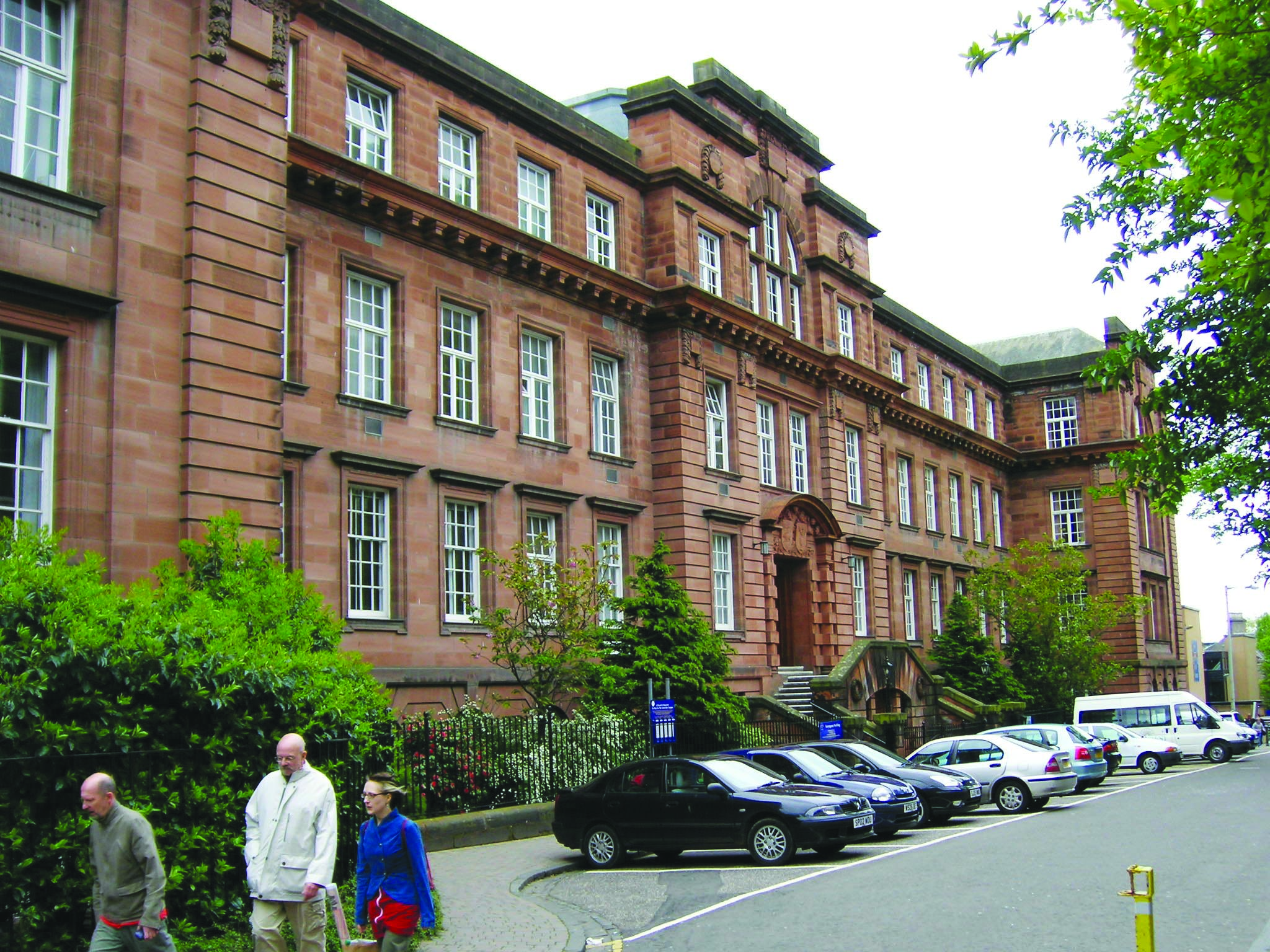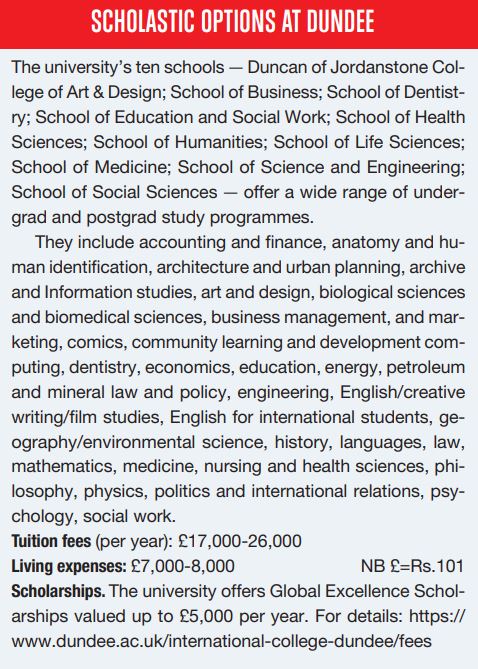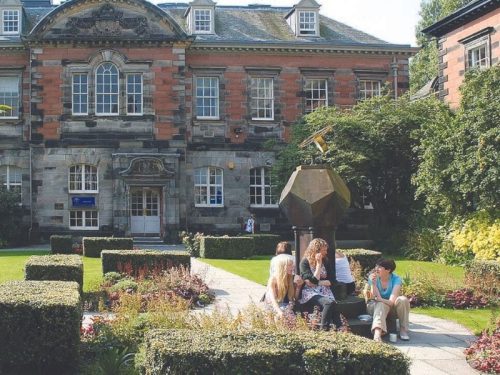University of Dundee, Scotland
Currently, UoD’s ten schools offer a range of undergraduate and postgrad programmes to 15,000, including 3,000 international students from 145 countries worldwide.

Serene UoD campus: 3,000 international students, 145 countries
SCOTLAND, A COUNTRY (POP.5.5 MILLION) with its own parliament, which with England, Wales and Northern Ireland is known as the United Kingdom, has 15 well-reputed universities — Edinburgh, Glasgow, St. Andrews and Aberdeen among others. To this list, add the University of Dundee (UoD, estb.1967) which over the half-century past, has acquired an excellent reputation for teaching and research. A public research university, UoD is ranked #23 in the UK in The Times & Sunday Times Good University Guide 2021, #28 in the Complete University Guide 2022 and #31 in the Guardian University Guide 2022. Moreover, it is ranked #33 among British universities for ‘overall student satisfaction in the National Student Survey 2021.
Founded as an undergrad college in 1881 with a handsome donation from the Baxter family of textile manufacturers, UoD was a constituent college of the University of St. Andrews for several decades. Following significant expansion, it was conferred independent university status in 1967 by royal charter.
Currently, UoD’s ten schools — business, dentistry, education and social work, humanities, life sciences, medicine, health sciences, science and engineering, social sciences, and Duncan of Jordanstone College of Art and Design — offer a range of undergrad and postgraduate progammes to 15,000 including 3,000 international students from 145 countries around the world. The faculty-student ratio is an enviable 1:14.
Dundee. Set in an idyllic location on the banks of River Tay in coastal east Scotland, Dundee (pop.140,000) is a compact, cosmopolitan city. Hub of the global India-based jute industry of the 19th century, Dundee, with its other major industries, was known as the city of “jute, jam and journalism”. Over the past three decades, it has evolved into an epicentre of the biomedical and new technologies industries and now
accounts for 10 percent of the UK’s digital entertainment industry, including mobile apps development and gaming. In 2014, Dundee was felicitated by the United Nations as the UK’s first Unesco City of Design for its diverse contributions to medical research and innovative video games industry.
As in the rest of lowland Scotland, Dundee’s climate is oceanic. Summers are warm (18o C) and cloudy and winters long and cold (-1o
C) with substantial annual rainfall. It is well connected by road and rail with Glasgow and Edinburgh.

Scrymgeour Building
Campus facilities. The university’s main campus is sited in upscale West End in proximity to the city’s major cultural attractions, popular restaurants and transport hubs. Over the past half century after it was conferred university status, UoD has rapidly expanded from a mere four buildings in the 1960s to over 50 currently. The buildings in the heart of the university form the Geddes Quadrangle. They include the Carnegie, Harris and Peters Buildings constructed in 1909 when this institution was a college of the University of St. Andrews. Other campus landmarks include the Sir James Black Centre (life sciences), Scrymgeour Building (law school), Queen Mother Building (computing), Crawford Building (Duncan of Jordanstone College of Art & Design) and Dundee University Students’ Association (a five-storey building with restaurants and social venues). Moreover, the university’s four libraries provide access to a wide range of electronic and printed books, journals, DVDs, Blu-ray discs, videos and numerous online databases. UoD’s Institute of Sport and Exercise is also well-endowed. Facilities include indoor and outdoor sporting venues (gym, tennis and squash courts, swimming, field rugby, etc). Moreover, the university hosts 230 student societies that organise a range of social and cultural activities throughout the year for students.
 Admission. Applications for admission into UoD’s undergraduate programmes have to be made through the UK’s Universities and Colleges Admissions Service (www.ucas.com). The admission deadline is January 26, 2022 for the academic year 2022-23. The minimum eligibility admission criterion is successful completion of class XII/Plus Two (60 percent-plus in CBSE, ISC or leading state board exams; and 85 percent-plus for medicine or dentistry programmes), and English language proficiency (TOEFL, IELTS and PTE-Academic).
Admission. Applications for admission into UoD’s undergraduate programmes have to be made through the UK’s Universities and Colleges Admissions Service (www.ucas.com). The admission deadline is January 26, 2022 for the academic year 2022-23. The minimum eligibility admission criterion is successful completion of class XII/Plus Two (60 percent-plus in CBSE, ISC or leading state board exams; and 85 percent-plus for medicine or dentistry programmes), and English language proficiency (TOEFL, IELTS and PTE-Academic).
Admission applications for postgraduate programmes need to be made directly to the university. Eligibility requirements: a bachelor’s degree from a recognised university and English language proficiency. For further information, contact Grant Smith, Senior International Officer; T: +44 (0) 1382 38 38 38; e-mail: [email protected]; website: www.dundee.ac.uk.
Accommodation. Students have a range of university-provided accommodation to choose from — Belmont Flats, Belmont Tower, Balfour Flats, Haethfield, Seabraes Flats, West Park Flats, and West Park Villas. All student accommodation is self-catering with shared kitchens and en-suite bedrooms. Students can choose between standard and premier rooms (£4,882-6,039 per year).
Degree programmes. The university’s ten schools offer our 400 undergrad and postgrad study programmes including four/five-year honours degree courses.
Also read: University of Dundee offers scholarship for MSc Islamic Finance

















Add comment